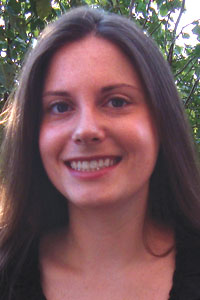Katherine Kinzler
 The University of Chicago, USA
The University of Chicago, USA
What does your research focus on?
My research focuses on the development of social cognition. I believe that studying early development is essential for understanding the nature and potential malleability of human social interactions. Much of my research investigates infants’ and children’s reasoning about language as a social category. I find that even before they can talk themselves, children evaluate others based on how they speak. Children’s language-based social evaluations persist throughout development. In several cases, I find that children’s social preferences for others based on their language and accent are greater than those based on race.
What drew you to this line of research? Why is it exciting to you?
Psycholinguists, anthropologists, and historians have long argued that language and accent have important consequences for how we view others. Though many psychologists are interested in the origins and development of social cognition, studies of language as a social category are somewhat underrepresented in research by experimental psychologists who study social groups. My research explores the developmental origins of language as a social category. I find it fascinating to observe empirical evidence that language entails an important, and potentially primary, factor by which we evaluate our social world.
Who were/are your mentors or psychological influences?
I have been fortunate in having fantastic mentors. As an undergraduate at Yale, I took a class on cognitive development with Karen Wynn, and was immediately hooked. I then spent the next two years working as a research assistant in her lab, which cemented my desire to attend graduate school. My graduate advisor Elizabeth Spelke has been an incredible mentor. She is both brilliant and supportive, and encouraged me throughout graduate school at Harvard and beyond. I hope to be as good a mentor to my own graduate students. As an assistant professor at the University of Chicago, I have wonderful and supportive senior colleagues in developmental psychology — Susan Goldin-Meadow, Susan Levine, and Amanda Woodward.
To what do you attribute your success in the science?
In many ways, I was very lucky. I had fantastic mentors and fantastic opportunities. I feel fortunate that my dissertation research proceeded in interesting ways. I also have worked hard — projects rarely are successful the first time around. I think that perseverance is very important.
What’s your future research agenda?
Much of my research so far on infants’ and children’s reasoning about language as a marker of social group membership focuses on monolingual children. Yet, most children in most countries are exposed to more than one language early in development. I am particularly interested in exploring how monolingual and bilingual children compare. I am also interested in thinking about how early preferences for native speech and native speakers interact with cultural beliefs about linguistic status.
Any advice for even younger psychological scientists? What would you tell someone just now entering graduate school or getting their PhD?
I would suggest choosing a topic you love, and also working on a few different research projects at once. Having a research project fail can feel so crushing (particularly if it is your first one!), so working on a few ideas or lines of research can help. I would also advise to take a deep breath and step back from your research once in a while.
What publication are you most proud of or feel has been most important to your career?
Kinzler, K. D., Dupoux, E., & Spelke, E. S. (2007). The native language of social cognition. The Proceedings of the National Academy of Sciences of the United States of America, 104, 12577-12580.
I am particularly proud of this paper, as it began with data collected during my very first year of graduate school. This paper provides evidence that infants preferentially interact with others who speak their native language. I was excited about this topic as a student, and this area of research continues to captivate me today.





APS regularly opens certain online articles for discussion on our website. Effective February 2021, you must be a logged-in APS member to post comments. By posting a comment, you agree to our Community Guidelines and the display of your profile information, including your name and affiliation. Any opinions, findings, conclusions, or recommendations present in article comments are those of the writers and do not necessarily reflect the views of APS or the article’s author. For more information, please see our Community Guidelines.
Please login with your APS account to comment.